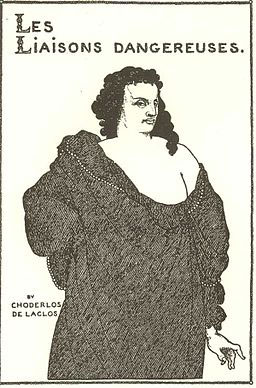
(This image is in the public domain.)
- Is Les Liaisons dangereuses a tragic novel? All the characters possess intelligence and leisure. They belong to a small, closed society where members have nothing better to do than to engage in futile and often dubious amusements. Choose two or three characters and argue that they are tragic figures or not. Think about the various codes of honor to which they subscribe: i.e., libertine, religiously committed. Do you, as a reader, care about their fate? Why? Why not?
- In his relationship with Tourvel, Valmont is time and again confronted by the conflict between his own feelings and his image of himself. Think about his devotion to Libertine principles: efficiency, self-control, control of others, use of gossip or threat of gossip, erotic justification, and humiliation of victims. Choose moments in the letters when his libertine principles are challenged by his genuine emotions. Argue that his death is a suicide (Danceny must not have been a very strong opponent) due, like Tourvel’s death, to unbearable internal conflict. (Consider his relationship to Merteuil in your response.)
- In Letter 81 Merteuil offers a defense of how she was forced to design her identity given the role of women in her society. Argue that the book is, or is not a feminist text. As you discuss this, choose one of the two movies and discuss whether the film presents a strong defensible argument either way. State your case for the book, and then have a nice transition sentence to the movie.
- In his Introduction David Coward says: “The ambiguity begins even before events start to unfold. The ‘Editor’s preface’ states that the correspondence we are about to read is authentic and makes the standard eighteenth-century case for moral usefulness. Yet the ‘Publisher’s Forward’ denies both claims: what we are about to read is a novel which is unlikely to produce any moral effect whatsoever. Both were written by Laclos, and both are heavily ironic. By the time the first letter reaches us, the author has locked himself inside his stoutly defended novel and never reappears." Make an argument about how we should read Les Liaisons dangereuses.
- Considering the fact that a central theme of Les Liaisons dangereuses is sexual conflict between Merteuil and Valmont, there are surprisingly few overtly sexual scenes. Yet there is a lot of sexual tension. How is this tension created in the novel? Choose one movie version and argue that the sexual tension on the screen is more or less overtly presented. Argue that one kind of presentation (on the screen or on the page) is more effective. To avoid generalizations compare the presentation of one or two scenes from the book and on the screen.










